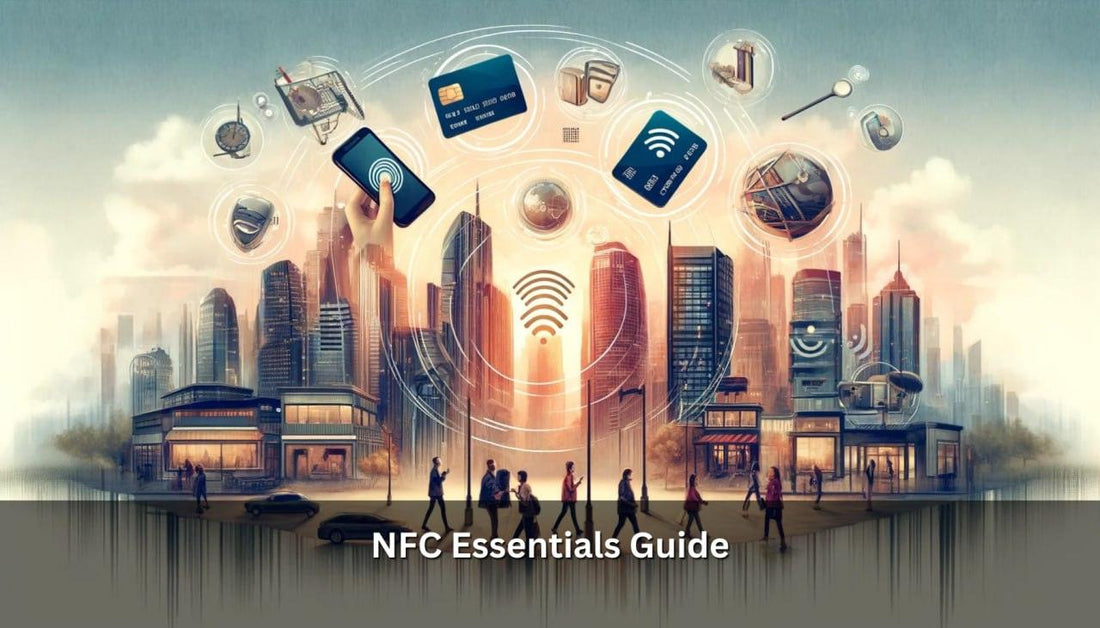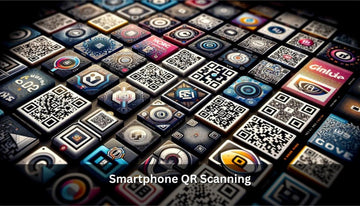NFC Essentials Guide

Introduction to NFC Technology
Near Field Communication (NFC) is a technology that enables the wireless exchange of data over short distances. Originating from RFID (radio frequency identification), NFC operates at a higher frequency, which allows for quicker data transfer but limits its range to about 4 cm. This technology is embedded in many modern devices such as smartphones, tablets, and wearable devices, facilitating a wide array of applications from contactless payments to digital content sharing and smart product interactions. By simply tapping devices together or bringing them into close proximity, NFC offers a seamless, fast, and secure way to communicate (FreeCodeCamp).
For a more detailed exploration of NFC, its history, and its applications, you can visit this resource: TechJury - NFC Guide.
Basics of RFID and NFC
How Do NFC Tags Work?
NFC tags function through a small, unpowered microchip that stores data to be accessed by NFC-enabled devices like smartphones. When an NFC device comes into close proximity (typically within 4 cm), it generates a magnetic field that powers the tag, enabling the transfer of data. This interaction doesn't require manual pairing or device discovery as seen with Bluetooth; it's triggered automatically by proximity.
The process starts with the NFC device sending a radio frequency signal that activates the tag. Once activated, the tag modulates this signal to send its data back to the device. The data transfer is highly secure due to the short operational range, minimizing potential eavesdropping. NFC tags can be programmed with a variety of information, such as URLs, contact details, or commands to control smart home devices. This versatility allows NFC tags to facilitate everything from contactless payments to setting up Wi-Fi networks with just a tap.
Exploring the Benefits of NFC for Businesses
NFC technology offers several compelling advantages for businesses, enhancing both operational efficiency and customer engagement. One of the primary benefits is the speed and convenience of contactless transactions. NFC enables quick, secure payments, reducing queue times and improving the customer experience. This is particularly valuable in fast-paced retail environments and during peak business hours.
Moreover, NFC enhances customer interaction with products and services through smart marketing strategies. By embedding NFC tags in promotional materials or products, businesses can provide customers with instant access to additional information, special offers, and interactive content, thereby deepening engagement and potentially increasing sales.
NFC also supports streamlined operations, such as inventory management and asset tracking, by allowing for effortless scanning and tracking of goods. This reduces human error and increases the accuracy of inventory data.
Additionally, NFC can improve security protocols, facilitating easy and secure access control to buildings and systems within a business. This use of NFC for secure identification ensures that only authorized personnel can access sensitive areas or information, bolstering overall security.
These multifaceted benefits make NFC a versatile tool that can be leveraged across various aspects of business operations, from payment processing to marketing and security.
Instant Connection and Efficiency
NFC technology is prized for its ability to create instant connections, significantly enhancing operational efficiency for businesses. With a simple tap, NFC enables devices to communicate, bypassing the need for manual setup or waiting periods typical of other wireless communications like Bluetooth. This instantaneity is particularly crucial in fast-paced environments where time savings translate directly into improved customer service and increased transaction throughput.
Additionally, NFC's ease of use simplifies interactions. Consumers can effortlessly engage with services, from making payments to accessing digital content, just by bringing their devices close to an NFC point. This hassle-free interaction not only boosts customer satisfaction but also encourages more frequent use of NFC-based services, streamlining operations and reducing the overhead associated with traditional methods. This efficiency extends beyond customer-facing applications, benefiting internal processes like inventory management and employee access control, where quick taps can replace more cumbersome processes.
Revolutionizing Business Cards with NFC
Innovative Applications of NFC in Business
NFC technology is pushing the boundaries of innovation in business, facilitating a range of applications that extend far beyond simple transactions. One of the standout uses is in marketing, where NFC tags are embedded into posters, flyers, and even product packaging. By tapping these materials with an NFC-enabled device, consumers can access interactive content, special offers, and detailed product information instantly. This interaction not only enhances the consumer experience but also provides businesses with valuable analytics on customer engagement.
In addition to marketing, NFC is revolutionizing inventory management and asset tracking within companies. Tags can be attached to items allowing for real-time tracking and updates, greatly improving inventory accuracy and reducing loss.
Furthermore, NFC enhances event management by streamlining entry processes through NFC-enabled tickets, which speed up admissions and reduce bottlenecks at entry points. For corporate security, NFC is used for controlled access to buildings, secure areas, and even in IT systems, ensuring that only authorized personnel can gain access through encrypted credentials.
These diverse applications demonstrate NFC's potential to transform various aspects of business operations, making processes more efficient, secure, and customer-friendly.
NFC Payments: Effortless and Secure
Neobanks, traditional banks, and financial services are tapping into NFC's potential to streamline financial transactions. Leading innovators such as Revolut and Bunq have introduced the ability to create payment URLs and QR codes, seamlessly integrated into NFC cards. PayPal, renowned for its money transfer capabilities, supports similar functionalities. By embedding these URLs in NFC business cards, users can initiate payments effortlessly with just a tap against a smartphone. This integration of NFC technology in financial services makes transactions not only instant but also secure, marrying convenience with robust functionality to redefine the payment experience. For more details on how NFC smart business cards are transforming transactions, see Transform Your Transactions: Leveraging NFC Smart Business Cards for Seamless Payments.

Enhancing Customer Engagement Through NFC
NFC technology is revolutionizing customer engagement by turning everyday objects into interactive touchpoints. By embedding NFC tags in products, businesses can deliver personalized content directly to consumers' smartphones. For example, a customer tapping an NFC-enabled product could receive usage tips, related promotions, or loyalty rewards instantly. This direct interaction not only enriches the shopping experience but also builds a data-driven understanding of consumer preferences, enabling more targeted marketing efforts. Additionally, NFC can facilitate social media integrations, allowing customers to share their experiences with just a tap, further amplifying brand engagement and visibility. These capabilities make NFC a powerful tool for enhancing customer relationships and driving brand loyalty.
We at NFC Tagify provide all sort of NFC Solutions or you may contact us: Tel. 01600800080, Email: info@nfctagify.com








